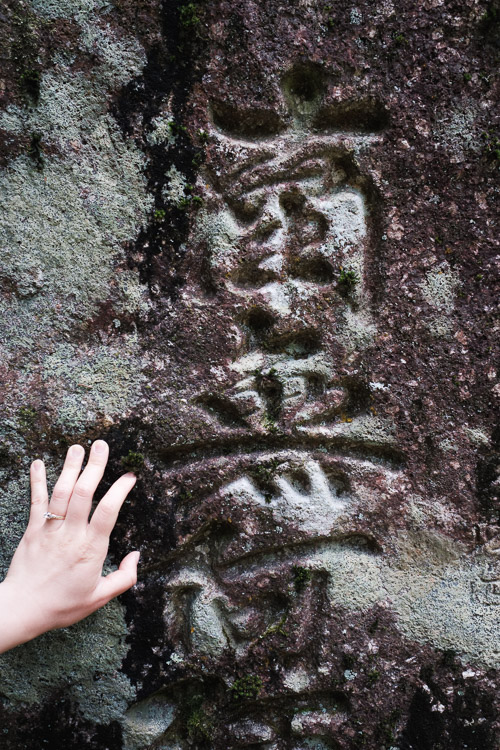
May 15th, 2019
Magome -> Tsumago
More roaming thunderclouds today. Listen to them rumble in an audio immersion I recorded.
Today I walk onward, over a mountain pass and down into the Post Town of Tsumago. This section of trail is well maintained; a mark of the community's dedicated effort to keep a tangible connection to the past from fading beyond memory. As such, it is the most popular part of the Nakasendo Trail: a journey between towns, and a journey to the past.

Taking the time to stop at stone monuments covered with creeping green moss, there is only the sound of the forest, until...not. Cutting the silence as they approach, steady strides of other hikers mix with the chatter of a roving group of schoolchildren on a field trip. They pass, and their pitapat fades.
I have decided to walk slowly today - to follow the footprints of those that I admire on this historic path. Matsuo Basho, the 17th century haiku master, was known to walk here. His poems are infused with a love of nature and a desire to connect to the simplicity of living, and I hear his voice in conversation with mine as I plod along.
Tracing my fingers along rough etchings on stone monuments, I wonder at the lives of past walkers. Where were they going? Who were they with? What were they thinking during their long days of walking?

There are only faded touches of the past left to preserve. I greet a lone 300 year old tree amidst otherwise second growth forest. I count only a few hundred meters of the original stone pathway remaining. I stop for tea with an elder in an open-walled hut, once used as a checkpoint to stop illegal logging of treasured cypress trees - like the one I had just touched.
Dipping my toes in the cold waters of a river, I lean back. Basho probably didn't wear Blundstones, but I imagine that the pleasure of cooling one's feet after a day of walking is a universal experience.

I arrive in Tsumago in the late afternoon. Souta, my host, is an anomaly here. For one, he is young - and seemingly absent in his own home. His house is in a state of disrepair; renovations begun but only halfway finished, as if heart was lost on the way to their completion. The shower is basic, requiring a bucket and a few hoops to be jumped through in order to avoid electrocuting oneself. And the room...unprepared, which is almost strange to mention because rooms here are so basic. A pale pink comforter I find in the living room will suffice to keep me warm on the dusty futon tonight.
This happens with accommodations sometimes, being a little less than expected. In these cases I tend to slip out to spend my time in the town rather than sit around brooding / worrying / ruminating.
But there is a twist in the plot: belying his shyness, Souta insists that I join him for dinner. I am surprised, but graciously accept. Amidst piles of unwashed dishes he conjures up a huge serving of nabemono, Japanese hot pot simmering with tofu, enoki mushrooms, and other morsels. Gently setting the heavy dish on the table, he shares that this is his favourite dish - even in summer, despite it usually being a winter meal. The warm food melts any lingering shyness, and he opens up.
Souta reveals that this home is inherited, a blessed curse that forced him to return to this quiet mountain town from his other life. Out of honour, he cannot sell it - for it has been in the family for a long time. His hands are tied and path forward uncertain.
I'm half convinced Souta rents out the back room of his home not for money, but for the conversation. And for this evening I am happy to share it with him.
A haiku:
Roaming thunder clouds
Dot the rolling horizon
Rain poured from a spout
D
You just read issue #9 of Afterwords Japan: Through the Torii Gate. You can also browse the full archives of this newsletter.